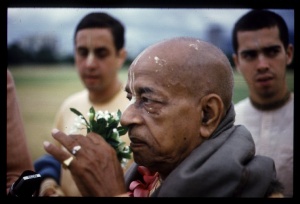SB 10.42.10: Difference between revisions
(Vanibot #0018 edit: make synonym terms in Sanskrit italic in SB - Vanisource) |
(Vanibot #0054 edit - transform synonyms into clickable links, which search similar occurrences) |
||
| Line 23: | Line 23: | ||
<div class="synonyms"> | <div class="synonyms"> | ||
''ehi'' | ''[//vanipedia.org/wiki/Special:VaniSearch?s=ehi&tab=syno_o&ds=1 ehi]'' — come; ''[//vanipedia.org/wiki/Special:VaniSearch?s=vīra&tab=syno_o&ds=1 vīra]'' — O hero; ''[//vanipedia.org/wiki/Special:VaniSearch?s=gṛham&tab=syno_o&ds=1 gṛham]'' — to my house; ''[//vanipedia.org/wiki/Special:VaniSearch?s=yāmaḥ&tab=syno_o&ds=1 yāmaḥ]'' — let us go; ''[//vanipedia.org/wiki/Special:VaniSearch?s=na&tab=syno_o&ds=1 na]'' — not; ''[//vanipedia.org/wiki/Special:VaniSearch?s=tvām&tab=syno_o&ds=1 tvām]'' — You; ''[//vanipedia.org/wiki/Special:VaniSearch?s=tyaktum&tab=syno_o&ds=1 tyaktum]'' — to leave; ''[//vanipedia.org/wiki/Special:VaniSearch?s=iha&tab=syno_o&ds=1 iha]'' — here; ''[//vanipedia.org/wiki/Special:VaniSearch?s=utsahe&tab=syno_o&ds=1 utsahe]'' — I can bear; ''[//vanipedia.org/wiki/Special:VaniSearch?s=tvayā&tab=syno_o&ds=1 tvayā]'' — by You; ''[//vanipedia.org/wiki/Special:VaniSearch?s=unmathita&tab=syno_o&ds=1 unmathita]'' — agitated; ''[//vanipedia.org/wiki/Special:VaniSearch?s=cittāyāḥ&tab=syno_o&ds=1 cittāyāḥ]'' — on her whose mind; ''[//vanipedia.org/wiki/Special:VaniSearch?s=prasīda&tab=syno_o&ds=1 prasīda]'' — please have mercy; ''[//vanipedia.org/wiki/Special:VaniSearch?s=puruṣa&tab=syno_o&ds=1 puruṣa]-[//vanipedia.org/wiki/Special:VaniSearch?s=ṛṣabha&tab=syno_o&ds=1 ṛṣabha]'' — O best of men. | ||
</div> | </div> | ||
Latest revision as of 19:01, 17 February 2024

A.C. Bhaktivedanta Swami Prabhupada
Please note: The synonyms, translation and purport of this verse were composed by disciples of Śrīla Prabhupāda
TEXT 10
- ehi vīra gṛhaṁ yāmo
- na tvāṁ tyaktum ihotsahe
- tvayonmathita-cittāyāḥ
- prasīda puruṣarṣabha
SYNONYMS
ehi — come; vīra — O hero; gṛham — to my house; yāmaḥ — let us go; na — not; tvām — You; tyaktum — to leave; iha — here; utsahe — I can bear; tvayā — by You; unmathita — agitated; cittāyāḥ — on her whose mind; prasīda — please have mercy; puruṣa-ṛṣabha — O best of men.
Translation and purport composed by disciples of Śrīla Prabhupāda
TRANSLATION
[Trivakrā said:] Come, O hero, let us go to my house. I cannot bear to leave You here. O best of males, please take pity on me, since You have agitated my mind.
PURPORT
Śrīla Viśvanātha Cakravartī supplies the following conversation:
Kṛṣṇa: Is it for the purpose of dining that you're inviting Me to your house?
Trivakrā: I simply can't leave You here.
Kṛṣṇa: But people here on the King's road will misconstrue what you're saying and laugh. Therefore please don't speak like this.
Trivakrā: I can't help being agitated. You made the mistake of touching me. It's not my fault.